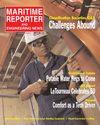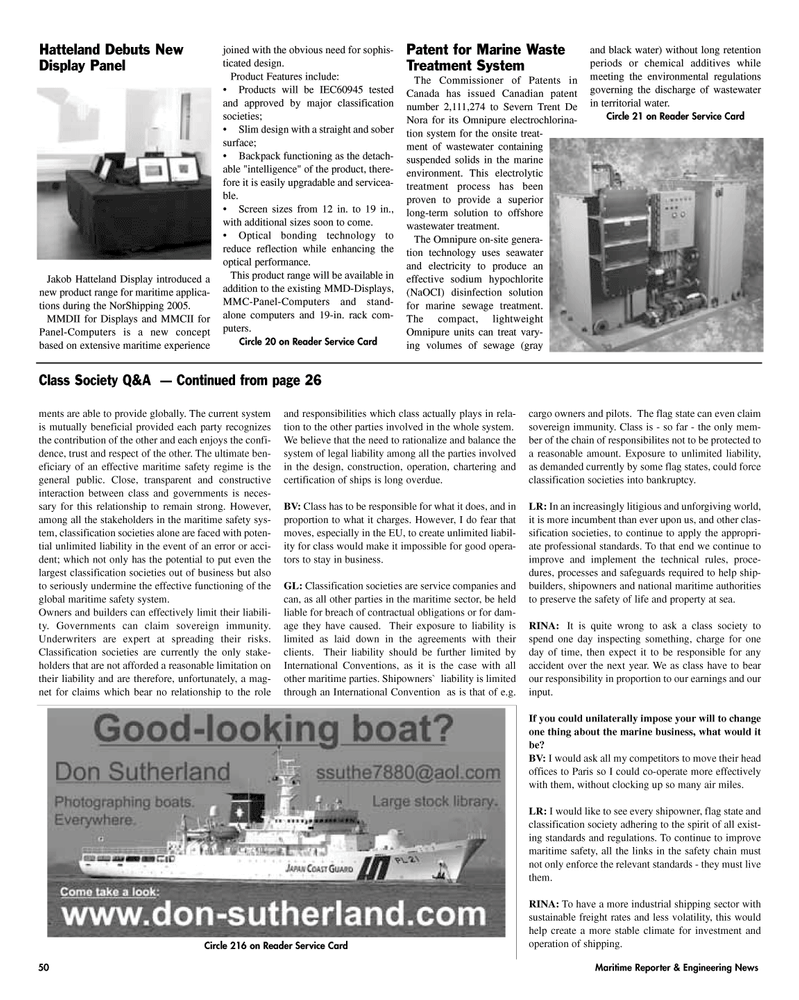
Page 50: of Maritime Reporter Magazine (August 2005)
AWO Edition: Inland & Offshore Waterways
Read this page in Pdf, Flash or Html5 edition of August 2005 Maritime Reporter Magazine
50 Maritime Reporter & Engineering News ments are able to provide globally. The current system is mutually beneficial provided each party recognizes the contribution of the other and each enjoys the confi- dence, trust and respect of the other. The ultimate ben- eficiary of an effective maritime safety regime is the general public. Close, transparent and constructive interaction between class and governments is neces- sary for this relationship to remain strong. However, among all the stakeholders in the maritime safety sys- tem, classification societies alone are faced with poten- tial unlimited liability in the event of an error or acci- dent; which not only has the potential to put even the largest classification societies out of business but also to seriously undermine the effective functioning of the global maritime safety system.
Owners and builders can effectively limit their liabili- ty. Governments can claim sovereign immunity.
Underwriters are expert at spreading their risks.
Classification societies are currently the only stake- holders that are not afforded a reasonable limitation on their liability and are therefore, unfortunately, a mag- net for claims which bear no relationship to the role and responsibilities which class actually plays in rela- tion to the other parties involved in the whole system.
We believe that the need to rationalize and balance the system of legal liability among all the parties involved in the design, construction, operation, chartering and certification of ships is long overdue.
BV: Class has to be responsible for what it does, and in proportion to what it charges. However, I do fear that moves, especially in the EU, to create unlimited liabil- ity for class would make it impossible for good opera- tors to stay in business.
GL: Classification societies are service companies and can, as all other parties in the maritime sector, be held liable for breach of contractual obligations or for dam- age they have caused. Their exposure to liability is limited as laid down in the agreements with their clients. Their liability should be further limited by
International Conventions, as it is the case with all other maritime parties. Shipowners` liability is limited through an International Convention as is that of e.g. cargo owners and pilots. The flag state can even claim sovereign immunity. Class is - so far - the only mem- ber of the chain of responsibilites not to be protected to a reasonable amount. Exposure to unlimited liability, as demanded currently by some flag states, could force classification societies into bankruptcy.
LR: In an increasingly litigious and unforgiving world, it is more incumbent than ever upon us, and other clas- sification societies, to continue to apply the appropri- ate professional standards. To that end we continue to improve and implement the technical rules, proce- dures, processes and safeguards required to help ship- builders, shipowners and national maritime authorities to preserve the safety of life and property at sea.
RINA: It is quite wrong to ask a class society to spend one day inspecting something, charge for one day of time, then expect it to be responsible for any accident over the next year. We as class have to bear our responsibility in proportion to our earnings and our input.
If you could unilaterally impose your will to change one thing about the marine business, what would it be?
BV: I would ask all my competitors to move their head offices to Paris so I could co-operate more effectively with them, without clocking up so many air miles.
LR: I would like to see every shipowner, flag state and classification society adhering to the spirit of all exist- ing standards and regulations. To continue to improve maritime safety, all the links in the safety chain must not only enforce the relevant standards - they must live them.
RINA: To have a more industrial shipping sector with sustainable freight rates and less volatility, this would help create a more stable climate for investment and operation of shipping.
Class Society Q&A — Continued from page 26
Circle 216 on Reader Service Card
Hatteland Debuts New
Display Panel
Jakob Hatteland Display introduced a new product range for maritime applica- tions during the NorShipping 2005.
MMDII for Displays and MMCII for
Panel-Computers is a new concept based on extensive maritime experience joined with the obvious need for sophis- ticated design.
Product Features include: • Products will be IEC60945 tested and approved by major classification societies; Slim design with a straight and sober surface; Backpack functioning as the detach- able "intelligence" of the product, there- fore it is easily upgradable and servicea- ble. Screen sizes from 12 in. to 19 in., with additional sizes soon to come. Optical bonding technology to reduce reflection while enhancing the optical performance.
This product range will be available in addition to the existing MMD-Displays,
MMC-Panel-Computers and stand- alone computers and 19-in. rack com- puters.
Circle 20 on Reader Service Card
Patent for Marine Waste
Treatment System
The Commissioner of Patents in
Canada has issued Canadian patent number 2,111,274 to Severn Trent De
Nora for its Omnipure electrochlorina- tion system for the onsite treat- ment of wastewater containing suspended solids in the marine environment. This electrolytic treatment process has been proven to provide a superior long-term solution to offshore wastewater treatment.
The Omnipure on-site genera- tion technology uses seawater and electricity to produce an effective sodium hypochlorite (NaOCI) disinfection solution for marine sewage treatment.
The compact, lightweight
Omnipure units can treat vary- ing volumes of sewage (gray and black water) without long retention periods or chemical additives while meeting the environmental regulations governing the discharge of wastewater in territorial water.
Circle 21 on Reader Service Card
MR AUGUST 2005 #7 (49-56).qxd 8/4/2005 9:21 PM Page 50

 49
49

 51
51
